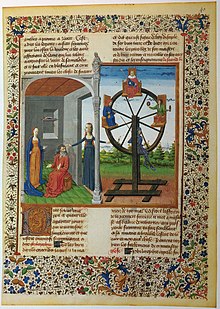
Back عزاء الفلسفة Arabic Утешението на философията Bulgarian Consolació de la filosofia Catalan Filosofiens trøst Danish Der Trost der Philosophie German Konsolo de filozofio Esperanto Consolación de la filosofía Spanish Filosoofia lohutus Estonian تسلای فلسفه Persian Filosofian lohdutus Finnish
 Page from a 15th century French manuscript | |
| Author | Boethius |
|---|---|
| Translators | |
| Language | Latin |
| Subject | Fate, Christian theology |
Publication date | 524 |
Published in English | Mid-14th century (Middle English) |
| 082.1 | |
Original text | The Consolation of Philosophy at Latin Wikisource |
| Translation | The Consolation of Philosophy at Wikisource |
| Part of a series on |
| Neoplatonism |
|---|
 |
|
|
On the Consolation of Philosophy (Latin: De consolatione philosophiae),[1] often titled as The Consolation of Philosophy or simply the Consolation, is a philosophical work by the Roman philosopher Boethius. Written in 523 while he was imprisoned and awaiting execution by the Ostrogothic King Theodoric, it is often described as the last great Western work of the Classical Period. Boethius' Consolation heavily influenced the philosophy of late antiquity, as well as Medieval and early Renaissance Christianity.[2][3]
- ^ Knowles, David (1967). "Boethius, Anicius Manlius Severinus", The Encyclopedia of Philosophy, Paul Edwards, v. 1, p. 329.
- ^ The Consolation of Philosophy (Oxford World's Classics), Introduction (2000)
- ^ Dante placed Boethius the "last of the Romans and first of the Scholastics" among the doctors in his Paradise (see The Divine Comedy) (see also below).